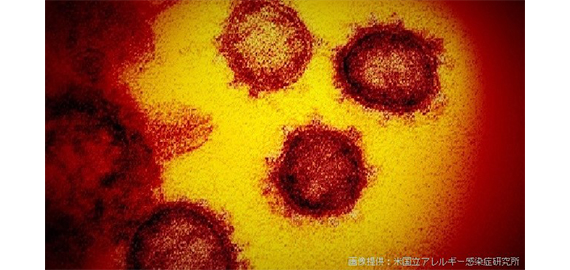
画像提供:米国立感染症研究所
Recently, a pneumonia of unknown cause had been detected in the city of Wuhan. China first reported the disease to the World Health Organization (WHO) on December 31, 2019. Subsequently, it has rapidly spread across the rest of the world. The WHO declared this outbreak "A Public Health Emergency of International Concern" on January 30, 2020. Then, on February 11, the WHO announced the official name for the new coronavirus disease: COVID-19.
As of March 11, 2020, throughout the world, infections have topped 118, 000 people in 114 countries, with a death toll is over 4,200. Specifically, China, Italy, Iran and South Korea have been seriously affected, and these four countries account for over 90% of infections around the world. As a consequence, the WHO finally characterized the COVID-19 as a "Pandemic". Currently, in Japan, there have been 568 reported infections and 12 fatalities. Furthermore, among passengers of the Diamond Princess cruise ship, 696 infections and 6 fatalities have been confirmed.
Based on these circumstances, Prime Minister Abe abruptly requested all elementary, junior and senior high schools to close from March 2 until spring vacation which will start in late March. This is an unprecedented situation. Needless to say, both the government and the ruling bloc, the LDP and KOMEITO, have taken various countermeasures against COVID-19 since its outbreak. However, Mr. Abe made the decision that the next two weeks are very important to curb further expansion of this disease.
The outbreak of COVID-19 has raised questions about China's public hygiene and medical care system. China has expanded economic and military policies prior to public hygiene, which resulted in insufficiencies for public hygiene. It is urgent for China to improve public hygiene including waterworks and sewer systems in the inland areas.
The epidemic of COVID-19 around the world is due to delays in the first response of the Wuhan government. However, essentially, this was caused by the excessive concentration of power and restrictions against critical remarks of the government . If the government of China fails to control the COVID-19 epidemic, the international society will lose trust in China and this will change the relationship with China for many countries.
Incidentally, the Japanese government has already requested people to suspend or postpone large scale events and gatherings. Furthermore, public offices and private companies have adopted telecommuting as one of the countermeasures against COVID-19. This is very effective to prevent this disease from spreading further. In Tokyo, many people commute to work on crowded trains every day. We need to change working styles and education to teleworking and online learning in the future.